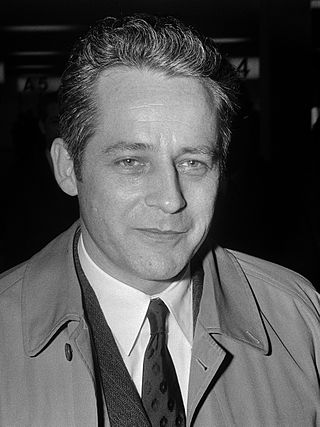
The Federal Council is the upper house of the Austrian Parliament, representing the nine States of Austria at the federal level. As part of a bicameral legislature alongside the National Council, it can be compared with an upper house or a senate. In fact, however, it is far less powerful than the National Council: although it has to approve every new law decided for by this lower chamber, the latter can – in most cases – overrule the Federal Council's refusal to approve.

Josef Klaus was an Austrian politician of the conservative People's Party (ÖVP). He served as State Governor (Landeshauptmann) of Salzburg from 1949 to 1961, as Minister of Finance from 1961 to 1963 and as Chancellor of Austria from 1964 to 1970.

Heide Schmidt is an Austrian politician.

Leopold GratzCGIH was an Austrian politician.

Heinz-Christian Strache is an Austrian politician and dental technician who served as Vice-Chancellor of Austria from 2017 to 2019 before resigning owing to his involvement in the Ibiza affair. He was also Minister of Civil Service and Sports from January 2018 to May 2019 and chairman of the Freedom Party (FPÖ) from April 2005 to May 2019. He previously served as a member of the National Council from October 2006 until December 2017 and as a member of the municipal council and state legislature of Vienna (2001–2006).

The Freedom Party of Austria is a political party in Austria, variously described as far-right, right-wing populist, national-conservative, eurosceptic and russophile. It has been led by Herbert Kickl since 2021. It is the largest of five parties in the National Council, with 57 of the 183 seats, and won 28.85% of votes cast in the 2024 election and it is represented in all nine state legislatures. On a European level, the FPÖ is a founding member of the Patriots.eu and its six MEPs sit with the Patriots for Europe (PfE) group following the dissolution of its predecessor, Identity and Democracy (ID).
Thomas Prinzhorn is an Austrian industrialist and politician of the national liberal party Alliance for the Future of Austria (BZÖ).

Ewald Johann Stadler, is an Austrian right-wing conservative politician. He was a member of the Freedom Party of Austria (FPÖ) until 2007, and a member of the Alliance for the Future of Austria (BZÖ) from 2007 until 2013. He ran for the European Parliament in 2009 as BZÖ's leading candidate and was a member of the European Parliament from 2011 to 2014. In 2014 he was chosen as the first party leader of The Reform Conservatives (REKOS).

Norbert Gerwald Hofer is an Austrian politician who was the leader of the Freedom Party of Austria (FPÖ) from June 2019 to June 2021. He previously served as minister of transport, innovation, and technology from 2017 to 2019 under Chancellor Sebastian Kurz.
Johannes Hübner is a former Austrian politician and Member of the Federal Parliament for Vienna South-West for the Freedom Party of Austria (FPÖ) 2008 - 2017. He previously sat in parliament for Vienna District 4 (1986-1997). He was until October 2017 the party's spokesman on Foreign Affairs.
Andreas F. Karlsböck was an Austrian politician. He was a Member of the National Council for the Freedom Party of Austria (FPÖ) from 2008 to 2017.

Mario Kunasek is an Austrian politician and non-commissioned officer, who was the Minister of Defense from December 2017 to May 2019.

The President of the National Council is the presiding officer of the National Council, the lower house of the Austrian Parliament.

An election was held in Austria on 26 May 2019 to elect the country's 18 members of the European Parliament. The Austrian People's Party (ÖVP) gained two seats for a total of seven, while the Freedom Party of Austria (FPÖ) and The Greens each lost one.

The German Burschenschaft (DB) is an association of Burschenschaften ; a co-operation of student associations of a certain form in Germany and Austria. It was created in 1881 as a General Deputies Convent (ADC) and received its current name in 1902. It goes back to the ideas associated with the founding of the native fraternetie in Jena in the year 1815. The ideal goals are outlined in the motto "Honour - Freedom - Fatherland".

Andrea Kdolsky is an Austrian physician and retired politician who was Minister for Health, Family and Youth in the Gusenbauer government.
Elisabeth Sickl is an Austrian retired politician.
Monika Forstinger is an Austrian businesswoman and former politician associated with the Freedom Party of Austria (FPÖ).

Legislative elections were held in Austria on 29 September 2024 to elect the 28th National Council, the lower house of Austria's bicameral parliament.

Otto Steinwender was an Austrian politician and professor, initially of liberal tendency, who later developed more nationalistic and radical ideas like reaction to the government of Eduard Taaffe, 11th Viscount Taaffe. Steinwender became one of the most important figures of the pan-German movement in Austria and collaborated closely with Georg Ritter von Schönerer, from whom he would later move away due to political differences to found the German-National Party and its successor, the German People's Party. He was a member of the Carinthian Landtag and the House of Representatives and a member of the Provisional National Assembly and the Bundesrat. From 1918 to 1919 he was also Secretary of State for Finance in the Renner government.















